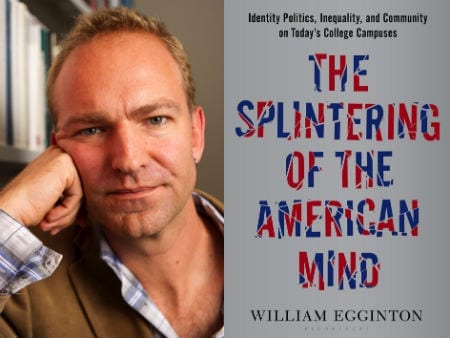A faculty discussion of William Egginton’s “The Splintering of the American Mind”
UTK faculty met to discuss William Egginton’s “The Splintering of the American Mind” before he come to speak on campus in January.


Ten faculty members from the humanities department met to discuss their thoughts and opinions of William Egginton’s “The Splintering of the American Mind.” Harrison Meadows from the Department of Foreign Languages and Literatures organized the talk. He wanted it to be a preemptive discussion about Egginton’s book before the author visits in January.
Meadows opened the discussion with the question, “Who is the audience?” He is referring to the intended audience of Egginton’s book and from there the entire discussion launched.
They discussed implications of Egginton’s thesis, what that could mean for education and whether they agreed with what he wrote.
The Book
Bloomsbury put out a synopsis of the book that sums up its main ideas. The book theorizes that identity politics have come to dominate college campuses, disrupting a higher priority to equality. Egginton thinks that an emphasis on individual rights is drawing too much focus away from group politics. This is causing a fault in communication between different groups that is “splintering the American mind.”
“The overarching thesis that Egginton is advocating for [in “The Splintering of the American Mind”] is the importance of the humanities and broad liberal arts education towards creating citizens. He proposes that we’ve lost a sense of community and that the liberal arts is an aspect of how to get back to that sense of community of talking to one another even when we disagree,” Meadows said.
The Lecture
On Jan. 27, 2020, Egginton will be in Lindsay Young Auditorium at 3:30 pm. His speech is titled, “Why the Liberal Arts are Fundamental to Democracy.” He will be the sixth of nine speakers to come to the university for this year’s Distinguished Lecture Series.
Egginton is a published author of 11 books and a researcher and professor at Johns Hopkins University. His focus is on Spanish and Latin American Literature, literary theory and the relationship between literature and philosophy. Links to his published books and featured articles can be found on his John Hopkins bio page.
“I think [the lecture] is for everyone. His argument is that everyone needs a broad liberal arts education, so I think any stake-holders in the university that get students and professors outside the humanities to at least engage with that as a notion should ask the question, ‘What is there to take from a traditional liberal arts education?’ Because he is going to advocate for and indicate what those things are and how we can be more interdisciplinary,” Meadows said.
Edited by Maddie Torres and Libby Dayhuff
Featured image courtesy of Fairfield University

